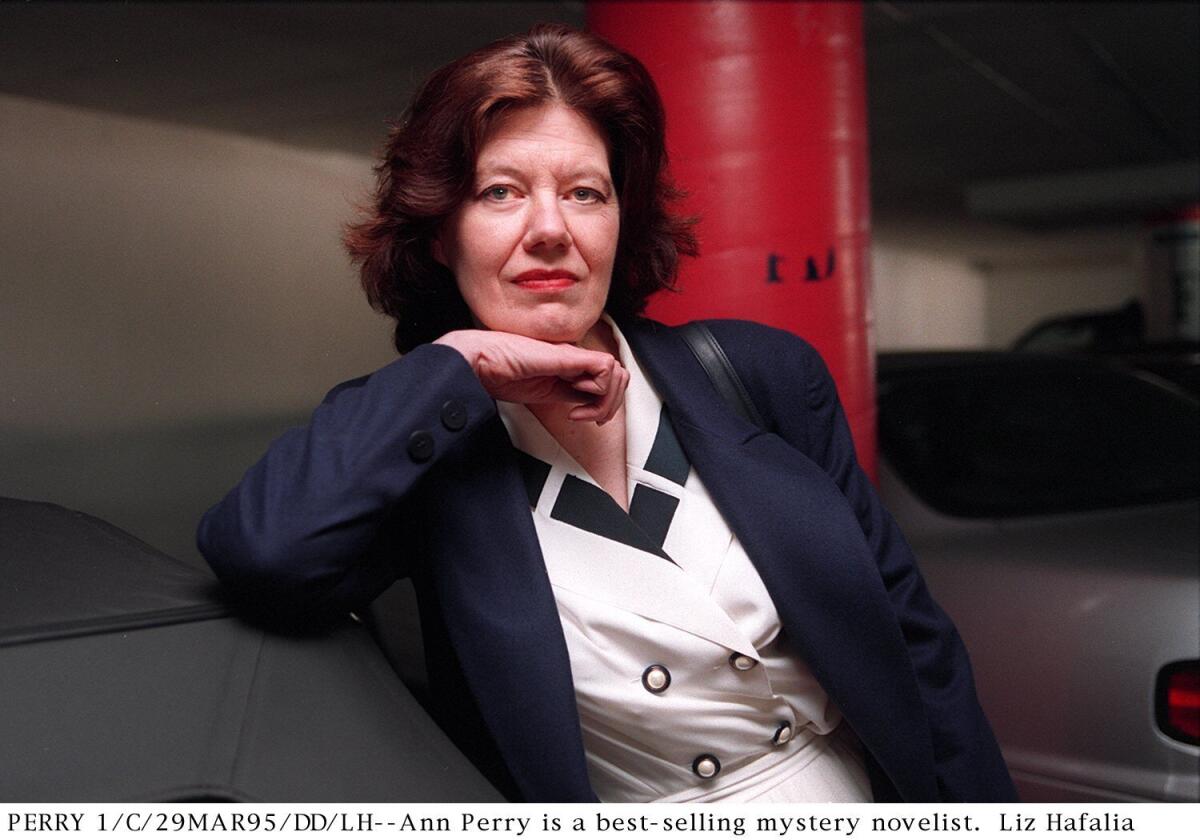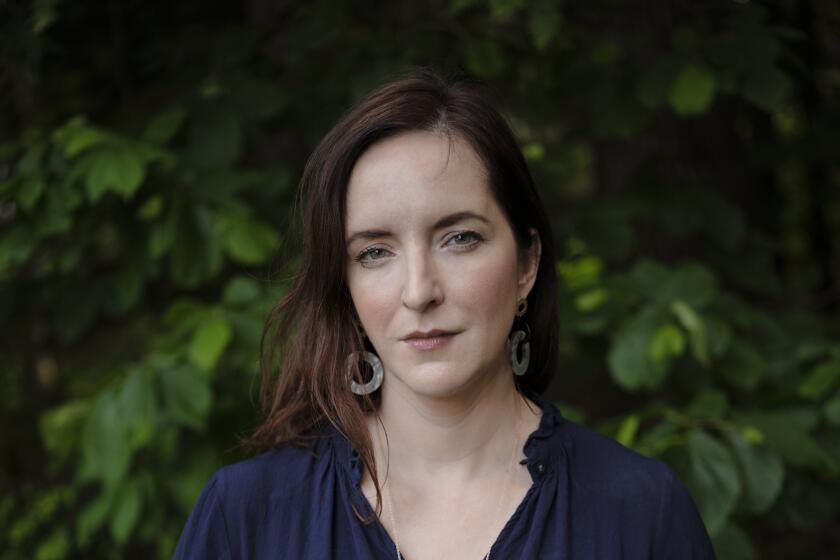Anne Perry, teen murderer turned crime writer, dies at 84

Anne Perry, a prolific British crime writer with a murderous past that was brought to light in Peter Jackson’s 1994 film “Heavenly Creatures,” has died. She was 84.
Perry died in a Los Angeles hospital on Monday, her literary agent, Meg Davis, told the New York Times on Wednesday. “Ms. Perry’s health had declined since she had a heart attack in December,” Davis said.
Perry’s 1979 debut novel, “The Cater Street Hangman,” and her 1993 historical mystery, “A Sudden, Fearful Death,” are among the author’s numerous period thrillers. But for nearly two decades of her soaring literary career, no one knew that the crime writer “Anne Perry” was actually the teenage murderer Juliet Hulme.
“Heavenly Creatures” is what Pauline Parker and Juliet Hulme called each other, but those are just words, and words, no matter how passionate and adoring, can only hint at the intensity of the attachment these two teen-age girls felt.
At 15, Perry served five years in prison for her part in bludgeoning to death Honorah Mary Parker, her best friend Pauline Parker’s mother, in Christchurch, New Zealand, in 1954. The two plotted her murder, using a brick stuffed inside a stocking, and wrote of the details and “anticipation” in journals found by the police.
Hulme was born Oct. 28, 1938, in London to physicist Henry Rainsford Hulme and marriage counselor Hilda Marion Hulme. As a child, Hulme developed tuberculosis. She told the New Zealand Herald in 2006 that doctors used experimental drugs (now recognized as mood-altering) to treat her tuberculosis.
“A long needle in your behind every third morning,” she said. “They’d catch you when you were still asleep.”
She moved to Christchurch, New Zealand, as a teenager and attended Christchurch Girls’ High School, where she met Parker. The two bonded intensely and planned to move to the United States to become famous novelists. They became so enmeshed that Parker’s mother attempted to put an end to their friendship, a move that enraged the angsty and dangerous teenagers.
When Hulme’s father and mother announced plans to divorce and relocate Hulme to South Africa to live with an aunt, Hulme wanted Parker to join her. Parker’s mother refused.
It’s a story of murder, hidden identity and, of course, public relations.
Police found enough evidence to arrest Parker on the night of her mother’s death and Hulme the next day. The entry in Parker’s diary on the day of the grisly murder was titled, “The Day of the Happy Event.” The case was sensationalized in their town due to the extraordinary circumstances and the two were found guilty and sent to separate prisons, never to speak again.
Hulme spent the first three months of her incarceration in solitary confinement at Mt. Eden women’s prison in Auckland. “It was cold, there were rats, canvas sheets and calico underwear,” she told the Guardian in a 2003 interview. “I had to wash out my sanitary towels by hand and they put me on to physical labor until I passed out.”
Hulme was released when she was 21, changed her name to Anne and took on her new stepfather’s surname. She said going to prison was the best thing that could have happened to her, allowing her to accept guilt and repent for her crime.
“Why can’t I be judged for who I am now, not what I was then?” Perry asked during her interview with the Guardian. “I had to give up my past — the hardest thing imaginable — and begin life in my new identity as Anne Perry, knowing even a tiny slip could unravel everything.”
Makkai, author of “The Great Believers,” explains why her follow-up, “I Have Some Questions for You,” tackles podcasting, murder and boarding school.
The murder carried out by the teens inspired Peter Jackson’s 1994 film “Heavenly Creatures,” in which Melanie Lynskey portrayed the sullen Parker and Kate Winslet the smug Hulme. In his review for The Times, Kenneth Turan wrote, “This ability to get inside hysteria and obsession, the skill to make us feel sensations as intensely as its protagonists, is what makes ‘Creatures’ memorable.”
“Heavenly Creatures” served as the catalyst for Perry being outed as Hulme. As the movie screened over the summer, New Zealand journalist Lin Ferguson of the Sunday News put the pieces together and revealed Perry’s true identity, forcing her to publicly reckon with her past.
Hulme slammed Fran Walsh and Jackson, who were nominated for an Oscar for their “Heavenly Creatures” screenplay, calling them “idiotic movie-makers” who made a film that painted a “grotesque and distorted portrait” of her. She later recanted her statement and said she was caught up in the heat of the moment.
Times Book Prize finalists Rachel Howzell Hall, Ivy Pochoda, S.A. Crosby, Jennifer Hillier and Christopher Bollen talk about race, place and genre.
Perry’s books grapple with murky morals, explore social and ethical issues and themes of sin and repentance. “It is vital for me to go on exploring moral matters,” she told the Guardian.
Perry moved to San Francisco in 1967 and then to Los Angeles, where she worked as a nanny and began writing the crime novels that catapulted her career. During that time, she converted to Mormonism, appreciating the religion for offering forgiveness of past sins.
Perry was a regular on the New York Times bestseller list, and her 100-plus mysteries and thrillers have garnered critical acclaim, selling more than 26 million copies worldwide. She won an Edgar Award in 2000 for her short story “Heroes” and the Times of London named her one of the “100 Masters of Crime.” In 2013 and 2020, she was guest of honor at Bouchercon, the international convention of mystery writers and fans.
“Of course I would like to be known as a great writer. Wouldn’t all writers?” she said in a 2013 interview with Open Road Media. “I’d like to be known as a thinker, a teacher, a philosopher, all these kind of things, but if I could just be known for being kind, that will do it.”
More to Read
Sign up for our Book Club newsletter
Get the latest news, events and more from the Los Angeles Times Book Club, and help us get L.A. reading and talking.
You may occasionally receive promotional content from the Los Angeles Times.









